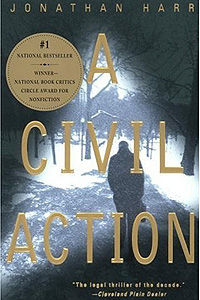Author Harr discusses his background, creative process for writing nonfiction
By Josh Schonwaldjschonwa@uchicago.edu
News Office
| Author Harr discusses his creative process for writing nonfiction that rivals any novel Last quarter, the Chronicle had a lengthy conversation with Jonathan Harr, this year's Robert Vare Nonfiction writer-in-residence and the author of the best-seller, A Civil Action. Hear Harr talk about his move from fiction to nonfiction, his notoriously meticulous research process, and how Sherlock Holmes and a fifth-grade teacher at Hyde Park’s Bret Harte School helped shape his writing and storytelling style. | |
1. Harr recalls his origins as a writer/journalist - which began right here in Hyde Park as a 5th grader at the Bret Harte school.
| Listen to Audio: |
2. Harr's career trajectory is different from many of his peers - he never took a formal creative writing class. Here, Harr talks about his journey, from college drop-out to VISTA volunteer in West Virginia to a New York City cab driver/aspiring novelist.
 Jonathan Harr | |
| Listen to Audio: |
3. Harr started his career as a wannabe novelist but quickly moved to nonfiction. He talks about his transition from fiction to journalism, his first experiences with longer form nonfiction as a writer for a New Haven alternative weekly, and his stint at the late New England Monthly, a magazine which launched the careers of several talented nonfiction authors.
| Listen to Audio: |
4. In one of his first classes, Harr told his students that he's very selective about who reads drafts of his work; in fact, he seeks feedback from only one person: Tracy Kidder. Kidder, one of Harr's closest friends, is also the same person who helped Harr begin his first book, A Civil Action. Here, Harr talks about the surprising bar room origins of his friendship with the Pulitzer prize winning author of The Soul of a New Machine, House, and Mountains Beyond Mountains.
| Listen to Audio: |
 A Civil Action | |
5. Harr talks about coming up with story ideas, the ingredients he looks for in a nonfiction story, why he prefers stories that have multiple characters and why the level of access he needs is so different from that of a conventional journalist.
| Listen to Audio: |
6. One of the most important parts of Harr's work is negotiating access to his subjects. Here, he talks about the lengthy process of gaining the trust of characters -- on both sides of the courtroom -- in a A Civil Action, and the techniques he uses when he isn't granted access.
| Listen to Audio: |
7. How does a nonfiction author create a "page turner"? Harr talks about the importance of maintaining a suspenseful narrative, why there is no formula for creating suspense in nonfiction, and the type of feedback he most likes from his readers..
| Listen to Audio: |
8. Harr talks about some of the writers and books that influenced his storytelling approach. He also talks about how his early love for Sir Arthur Conan Doyle's Sherlock Holmes novels unconsciously shaped his writing.
| Listen to Audio: |
9. Harr talks about his class “The Craft of Narrative Nonfiction,” why his experience at Chicago was much different from an earlier teaching stint at Smith College, and why he’s still not sure that writing is something that can be taught.
| Listen to Audio: |
10. Harr talks about the future of the genre of narrative nonfiction, his personal goals for the future, and why he wants to give fiction another try.
| Listen to Audio: |
![[Chronicle]](/images/sidebar_header_oct06.gif)